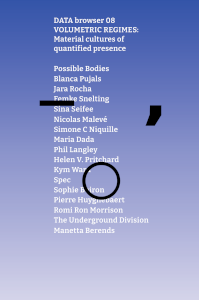Volumetric Regimes: material cultures of quantified presence
edited by Jara Rocha and Femke Snelting

- DATA Browser
- Published: 2022
- ISBN: 978-1-78542-116-7
- PDF ISBN: 978-1-78542-115-0
3D computation has historically co-evolved with Modern technosciences, and aligned with the regimes of optimisation, normalisation and hegemonic world order. The legacies and projections of industrial development leave traces of that imaginary and tell the stories of a lively tension between “the probable” and “the possible”. Defined as the techniques for measuring volumes, volumetrics all too easily (re)produce and accentuate the probable, and this process is intensified within the technocratic realm of contemporary hyper-computation. The ubiquity of efficient operations is deeply damaging in the way it gradually depletes the world of all possibility for engagement, interporousness and lively potential. Volumetric Regimes: material cultures of quantified presence proposes an urgent intersectional inquiry into volumetrics to foreground procedural, theoretical and infrastructural practices that provide with a widening of the possible.
Volumetric Regimes emerges from Possible Bodies, a collaborative research activated by Jara Rocha and Femke Snelting on the very concrete and at the same time complex and fictional entities that “bodies” are, asking what matter-cultural conditions of possibility render them present. This becomes especially urgent in relation to technologies, infrastructures and techniques of 3D tracking, modelling and scanning. How does cyborg-ness participate in the presentation and representation of so-called bodies? Intersecting issues of race, gender, class, species, age and ability resurface through these performative as well as representational practices.
Contributors: Sophie Boiron, Maria Dada, Pierre Huyghebaert, Phil Langley, Nicolas Malevé, Romi Ron Morrison, Simone C. Niquille, Helen V. Pritchard, Jara Rocha, Sina Seifee, Femke Snelting, Kym Ward.
Bodies are concrete reality. Bodies are abstract. When bodies are modelled, scanned, generated in virtual realities, and presented back to us and others, are they real, ideal, neutral, skewed? When abstracted bodies speak for us and do things on our behalf, what politics do they enact? This radical multi-form collective investigation traces the cutting edge of how bodies and subjects are rendered technologically. It proposes multi-dimensional forms of intervention, and claims an experimental horizon of the possible, shattering the mantra of unavoidability.Professor Olga Goriunova, Royal Holloway University of LondonVolumetric Regimes makes an essential contribution to the ways in which we must rethink matter politically and ecologically. As the book unfolds, ontological questions of intensities, dimensions, and substance are denaturalised as mere properties of matter that can be measured, modified, and thus computed, which today are exemplified by 3D modelling and parametric design, but are shown to be part of processional life-worlds that relational and mutually informed and informing. Not the partitioning of bodies, particles, datapoints, and spaces as techno-capital and techno-science would have it but a material enmeshment that brings the volumetric into presence otherwise.Susan Schuppli, author Material Witness , MIT Press, 2021Editor Bios
Jara Rocha is an interdependent researcher-artist. They are currently involved in several disobedient action research projects, such as Volumetric Regimes (with Femke Snelting), The Underground Division (with Helen Pritchard and Femke Snelting), The Relearning Series (with Martino Morandi), and Vibes & Leaks (with Kym Ward and Xavier Gorgol). They are part of the curatorial teams of DONE at Foto Colectania, of ISEA at Arts Santa Mònica and of La Capella, all in Barcelona; Jara also teaches screen studies at the Escola Superior de Cinema i Audiovisuals de Catalunya, as well as at the Körper, Theorie und Poetik des Performativen Department at Staatliche Akademie der Bildenden Künste, Stuttgart. With Karl Moubarak and Cristina Cochior, they conform the Cell for Digital Discomfort at the 21/22 Fellowship for Situated Research of BAK, Utrecht. Jara works through the situated, mundane, and complex forms of distribution of the technological with an antifascist and trans*feminist sensibility, and their show “Naturoculturas son disturbios” emits erratically from dublab.es radio.
Femke Snelting develops projects at the intersection of design, feminisms, and free software in various constellations. With Seda Gürses, Miriyam Aouragh, and Helen Pritchard, she runs the Institute for Technology in the Public Interest. With the Underground Division (Helen Pritchard and Jara Rocha) she studies the computational imaginations of rock formations, and with Jara Rocha, Femke activates Possible Bodies. She is team member of Programmable Infrastructures (TUDelft), i-DAT (University of Plymouth) and supports artistic research at PhdArts (Leiden), MERIAN (Maastricht) and a.pass (Brussels). Femke teaches at XPUB (MA Experimental Publishing, Rotterdam).
